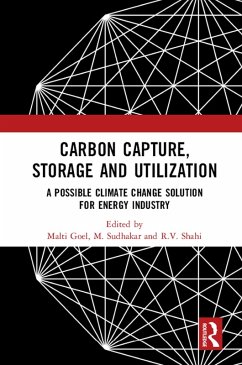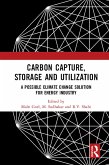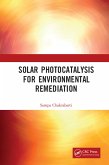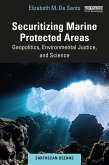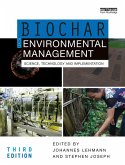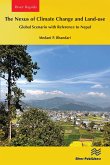Carbon Capture, Storage and Utilization (eBook, PDF)
A Possible Climate Change Solution for Energy Industry
Redaktion: Goel, Malti; Shahi, R. V.; Sudhakar, M.
51,95 €
51,95 €
inkl. MwSt.
Sofort per Download lieferbar

26 °P sammeln
51,95 €
Als Download kaufen

51,95 €
inkl. MwSt.
Sofort per Download lieferbar

26 °P sammeln
Jetzt verschenken
Alle Infos zum eBook verschenken
51,95 €
inkl. MwSt.
Sofort per Download lieferbar
Alle Infos zum eBook verschenken

26 °P sammeln
Carbon Capture, Storage and Utilization (eBook, PDF)
A Possible Climate Change Solution for Energy Industry
Redaktion: Goel, Malti; Shahi, R. V.; Sudhakar, M.
- Format: PDF
- Merkliste
- Auf die Merkliste
- Bewerten Bewerten
- Teilen
- Produkt teilen
- Produkterinnerung
- Produkterinnerung

Bitte loggen Sie sich zunächst in Ihr Kundenkonto ein oder registrieren Sie sich bei
bücher.de, um das eBook-Abo tolino select nutzen zu können.
Hier können Sie sich einloggen
Hier können Sie sich einloggen
Sie sind bereits eingeloggt. Klicken Sie auf 2. tolino select Abo, um fortzufahren.

Bitte loggen Sie sich zunächst in Ihr Kundenkonto ein oder registrieren Sie sich bei bücher.de, um das eBook-Abo tolino select nutzen zu können.
Carbon capture and storage (CCS) is among the advanced energy technologies suggested to make the conventional fossil fuel sources environmentally sustainable. It is of particular importance to coal-based economies.
- Geräte: PC
- mit Kopierschutz
- eBook Hilfe
- Größe: 11.39MB
Andere Kunden interessierten sich auch für
![Carbon Capture, Storage and Utilization (eBook, ePUB) Carbon Capture, Storage and Utilization (eBook, ePUB)]() Carbon Capture, Storage and Utilization (eBook, ePUB)51,95 €
Carbon Capture, Storage and Utilization (eBook, ePUB)51,95 €![Solar Photocatalysis for Environmental Remediation (eBook, PDF) Solar Photocatalysis for Environmental Remediation (eBook, PDF)]() Sampa ChakrabartiSolar Photocatalysis for Environmental Remediation (eBook, PDF)47,95 €
Sampa ChakrabartiSolar Photocatalysis for Environmental Remediation (eBook, PDF)47,95 €![Industrial Energy Systems Handbook (eBook, PDF) Industrial Energy Systems Handbook (eBook, PDF)]() A. E. WilliamsIndustrial Energy Systems Handbook (eBook, PDF)109,95 €
A. E. WilliamsIndustrial Energy Systems Handbook (eBook, PDF)109,95 €![Securitizing Marine Protected Areas (eBook, PDF) Securitizing Marine Protected Areas (eBook, PDF)]() Elizabeth M. De SantoSecuritizing Marine Protected Areas (eBook, PDF)43,95 €
Elizabeth M. De SantoSecuritizing Marine Protected Areas (eBook, PDF)43,95 €![Biochar for Environmental Management (eBook, PDF) Biochar for Environmental Management (eBook, PDF)]() Biochar for Environmental Management (eBook, PDF)85,95 €
Biochar for Environmental Management (eBook, PDF)85,95 €![The Nexus of Climate Change and Land-use - Global Scenario with Reference to Nepal (eBook, PDF) The Nexus of Climate Change and Land-use - Global Scenario with Reference to Nepal (eBook, PDF)]() Medani P. BhandariThe Nexus of Climate Change and Land-use - Global Scenario with Reference to Nepal (eBook, PDF)62,95 €
Medani P. BhandariThe Nexus of Climate Change and Land-use - Global Scenario with Reference to Nepal (eBook, PDF)62,95 €![Creating Resilient Landscapes in an Era of Climate Change (eBook, PDF) Creating Resilient Landscapes in an Era of Climate Change (eBook, PDF)]() Creating Resilient Landscapes in an Era of Climate Change (eBook, PDF)0,00 €
Creating Resilient Landscapes in an Era of Climate Change (eBook, PDF)0,00 €-
-
-
Carbon capture and storage (CCS) is among the advanced energy technologies suggested to make the conventional fossil fuel sources environmentally sustainable. It is of particular importance to coal-based economies.
Dieser Download kann aus rechtlichen Gründen nur mit Rechnungsadresse in A, B, BG, CY, CZ, D, DK, EW, E, FIN, F, GR, HR, H, IRL, I, LT, L, LR, M, NL, PL, P, R, S, SLO, SK ausgeliefert werden.
Produktdetails
- Produktdetails
- Verlag: Taylor & Francis eBooks
- Seitenzahl: 304
- Erscheinungstermin: 21. Februar 2019
- Englisch
- ISBN-13: 9780429607998
- Artikelnr.: 55336549
- Verlag: Taylor & Francis eBooks
- Seitenzahl: 304
- Erscheinungstermin: 21. Februar 2019
- Englisch
- ISBN-13: 9780429607998
- Artikelnr.: 55336549
- Herstellerkennzeichnung Die Herstellerinformationen sind derzeit nicht verfügbar.
Malti Goel was the first Indian scientist to represent India as Vice-chair to the Technical Group of an International Forum on Carbon Sequestration Leadership. As Adviser and Scientist 'G', Ministry of Science and Technology, Government of India, she headed the Inter-sectoral Science and Technology Advisory Committee Division (1998-2008). She has been Emeritus Scientist, Indian National Science Academy and in the Centre for Studies in Science Policy, Jawaharlal Nehru University, New Delhi. M. Sudhakar he has been serving as an Adviser and Scientist 'G' in the Ministry of Earth Sciences, Government of India, New Delhi and is heading the Awareness and Outreach Programmes and Vessel Management Divisions. R. V. Shahi is Fellow of World Academy of Productivity Sciences, Institution of Engineers (India), International Institute of Electrical Engineers, and Indian National Academy of Engineering. From April 2002 to January 2007, he was Secretary to the Government of India, Ministry of Power. He was also President of the Governing Council of Central Power Research Institute, Chairman of the Executive Committee of Bureau of Energy Efficiency, and Chairman of the Governing Council of National Power Training Institute.
SECTION I: POLICY 1. Carbon, Capture and Storage: Can or Should we be so
Indifferent? 2. Policy and Regulatory Interventions in Abatement of CO2
Footprints in India 3. Carbon Capture, Storage, and Utilization-an
Appraisal of Current Situation in Coal-based Economies 4. TERI'S Scoping
Study on Carbon Capture and Storage in the Indian Context 5. Capturing CO2
by Physical and Chemical Means SECTION II: CARBON CAPTURE AND STORAGE 6.
CO2 Recovery from Power Plants by Adsorption: R & D and Technology 7.
Geological Sequestration of CO2 in Saline Aquifers-an -Indian Perspective
8. Options for CO2 Storage and its Role in Reducing CO2 Emissions 9. CO2
Sequestration Potential of Indian Coalfiels 10. Carbon Sequestration
Potential of the Forests of North-eastern India SECTION III: CO2 FIXATION
AND UTILIZATION 11. Prospects in Biomimetic Carbon Sequestration12.
Bio-sequestration of CO2-Potential and Challenges 13. Cyanobacteria in
Carbon Dioxide Utilization and as Biosurfactants and Flocculants 14.
Production of Multi-purpose Fuels Through Carbon Capture and Sequestration
15. CO2 Storage and Enhanced Oil Recovery 16. Real-term Implications of
Carbon Sequestration in Coal Seams 17. CO2 Storage, Utilization Options,
and Ocean Application
Indifferent? 2. Policy and Regulatory Interventions in Abatement of CO2
Footprints in India 3. Carbon Capture, Storage, and Utilization-an
Appraisal of Current Situation in Coal-based Economies 4. TERI'S Scoping
Study on Carbon Capture and Storage in the Indian Context 5. Capturing CO2
by Physical and Chemical Means SECTION II: CARBON CAPTURE AND STORAGE 6.
CO2 Recovery from Power Plants by Adsorption: R & D and Technology 7.
Geological Sequestration of CO2 in Saline Aquifers-an -Indian Perspective
8. Options for CO2 Storage and its Role in Reducing CO2 Emissions 9. CO2
Sequestration Potential of Indian Coalfiels 10. Carbon Sequestration
Potential of the Forests of North-eastern India SECTION III: CO2 FIXATION
AND UTILIZATION 11. Prospects in Biomimetic Carbon Sequestration12.
Bio-sequestration of CO2-Potential and Challenges 13. Cyanobacteria in
Carbon Dioxide Utilization and as Biosurfactants and Flocculants 14.
Production of Multi-purpose Fuels Through Carbon Capture and Sequestration
15. CO2 Storage and Enhanced Oil Recovery 16. Real-term Implications of
Carbon Sequestration in Coal Seams 17. CO2 Storage, Utilization Options,
and Ocean Application
SECTION I: POLICY 1. Carbon, Capture and Storage: Can or Should we be so
Indifferent? 2. Policy and Regulatory Interventions in Abatement of CO2
Footprints in India 3. Carbon Capture, Storage, and Utilization-an
Appraisal of Current Situation in Coal-based Economies 4. TERI'S Scoping
Study on Carbon Capture and Storage in the Indian Context 5. Capturing CO2
by Physical and Chemical Means SECTION II: CARBON CAPTURE AND STORAGE 6.
CO2 Recovery from Power Plants by Adsorption: R & D and Technology 7.
Geological Sequestration of CO2 in Saline Aquifers-an -Indian Perspective
8. Options for CO2 Storage and its Role in Reducing CO2 Emissions 9. CO2
Sequestration Potential of Indian Coalfiels 10. Carbon Sequestration
Potential of the Forests of North-eastern India SECTION III: CO2 FIXATION
AND UTILIZATION 11. Prospects in Biomimetic Carbon Sequestration12.
Bio-sequestration of CO2-Potential and Challenges 13. Cyanobacteria in
Carbon Dioxide Utilization and as Biosurfactants and Flocculants 14.
Production of Multi-purpose Fuels Through Carbon Capture and Sequestration
15. CO2 Storage and Enhanced Oil Recovery 16. Real-term Implications of
Carbon Sequestration in Coal Seams 17. CO2 Storage, Utilization Options,
and Ocean Application
Indifferent? 2. Policy and Regulatory Interventions in Abatement of CO2
Footprints in India 3. Carbon Capture, Storage, and Utilization-an
Appraisal of Current Situation in Coal-based Economies 4. TERI'S Scoping
Study on Carbon Capture and Storage in the Indian Context 5. Capturing CO2
by Physical and Chemical Means SECTION II: CARBON CAPTURE AND STORAGE 6.
CO2 Recovery from Power Plants by Adsorption: R & D and Technology 7.
Geological Sequestration of CO2 in Saline Aquifers-an -Indian Perspective
8. Options for CO2 Storage and its Role in Reducing CO2 Emissions 9. CO2
Sequestration Potential of Indian Coalfiels 10. Carbon Sequestration
Potential of the Forests of North-eastern India SECTION III: CO2 FIXATION
AND UTILIZATION 11. Prospects in Biomimetic Carbon Sequestration12.
Bio-sequestration of CO2-Potential and Challenges 13. Cyanobacteria in
Carbon Dioxide Utilization and as Biosurfactants and Flocculants 14.
Production of Multi-purpose Fuels Through Carbon Capture and Sequestration
15. CO2 Storage and Enhanced Oil Recovery 16. Real-term Implications of
Carbon Sequestration in Coal Seams 17. CO2 Storage, Utilization Options,
and Ocean Application
